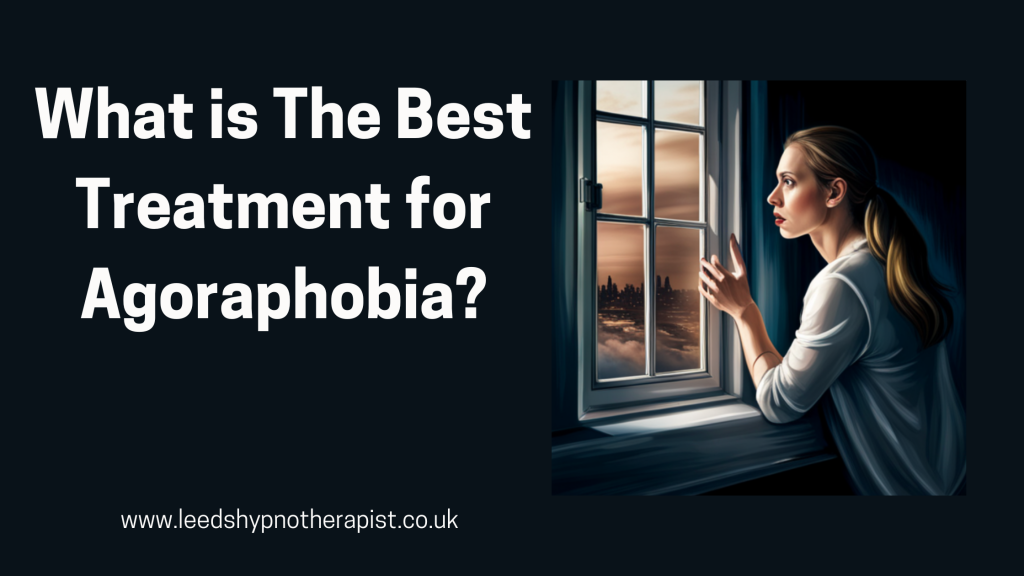When faced with agoraphobia, an anxiety disorder marked by fear of places and situations that might induce panic or embarrassment, many individuals seek refuge in a traditional treatment for agoraphobia like cognitive behavioural therapy (CBT). However, a rapidly evolving field in mental health care, Hypnotherapy, is demonstrating tremendous potential in treating agoraphobia with a faster and potentially more effective approach. It’s crucial to understand that every patient’s journey is unique, and while hypnotherapy may not be an instant cure for all, the growing proof of its effectiveness is hard to ignore. Join us as we delve deeper into the world of hypnotherapy and its transformative power in the realm of agoraphobia treatment.
Understanding Agoraphobia: A Closer Look
Agoraphobia, a type of panic disorder, is characterised by an intense fear and anxiety of being in places or situations where escape might be difficult, or help might not be available. This fear typically leads to avoidance of public places such as shopping centres or confined spaces like elevators, often resulting in significant restrictions in the individual’s life. Symptoms may include fear of crowds, open spaces, or travel, often escalating to the point where the sufferer may be unable to leave their home. Far more than simply a fear of open spaces, agoraphobia can be better understood as a fear of panic attacks, particularly in situations where escape would be difficult or embarrassing.
Agorapbia and Social Isolation
The impact of agoraphobia can go beyond the fear associated with specific places or situations. Agoraphobia can also breed social isolation, as the sufferer frequently retreats into safer environments, often their own home, to avoid the perceived threat of panic. Moreover, the constant fear and anxiety associated with this disorder can lead to other mental health issues such as depression and generalised anxiety disorder. The symptoms can vary in intensity, with some people feeling mildly anxious about certain situations while others may become incapacitated by their fear.
It’s also worth noting that agoraphobia often doesn’t develop in isolation. It can often be triggered by a traumatic event or a series of stressful life events — such as bereavement, relationship breakdown, or job loss — that leads the individual to associate certain places or situations with fear. This disorder is not a sign of weakness or a character flaw. It is a genuine, debilitating condition that requires understanding and appropriate treatment to manage effectively. Through this, it becomes evident that the journey to overcome agoraphobia is more than just addressing the fear; it’s about understanding and managing the root causes and the associated psychological impacts.
Symptoms of Agoraphobia to Look Out For
Common symptoms of agoraphobia can be both physical and psychological. Physically, individuals may experience symptoms similar to a panic attack, including shortness of breath, rapid heart rate, trembling, sweating, and feelings of impending doom. Some people may feel nauseous, light-headed, or even fear that they’re losing control or dying.
Psychological symptoms often involve an exaggerated fear of being alone or in enclosed spaces, travelling on public transport, being in crowded places, or being far from home. This can lead to avoidance behaviour, where individuals start to steer clear of situations or places they associate with these fears. In severe cases, this avoidance behaviour can lead to a person becoming housebound. It’s important to understand that the intensity of these symptoms can vary from person to person and even from day to day for the same individual. Recognising these symptoms is the first step towards seeking effective treatment for agoraphobia.
Cognitive Behavioural Therapy: The Traditional Route
Cognitive Behavioural Therapy (CBT) has long been the traditional route for treating agoraphobia. The crux of this treatment lies in its dual focus on both cognition (thoughts) and behaviour. In CBT, the therapist helps the individual understand that their fear is related to their interpretation of a situation, not the situation itself. The therapy encourages patients to confront their fears systematically and gradually, in what is known as exposure therapy.
The behavioural aspect of CBT involves changing specific actions, helping the patient to face rather than avoid situations that cause anxiety. In contrast, the cognitive aspect teaches people to understand how their thoughts contribute to their symptoms and to change the thought patterns that lead to fear and anxiety.
While CBT has proven effective for many, it’s a long-term approach that requires significant commitment from the patient. The process of facing fears and changing deeply ingrained thought patterns can be gradual and, at times, challenging. Although it has helped many people with agoraphobia regain control of their lives, the journey through CBT can be lengthy and requires resilience. Therefore, the search for more immediate, less stressful therapies is ongoing, with hypnotherapy emerging as a promising alternative.
Enter Hypnotherapy: A Promising Treatment for Agoraphobia
While traditional treatments like CBT and talk therapy can be effective, research has increasingly demonstrated the potential of hypnotherapy in treating agoraphobia. In contrast to other therapies, hypnotherapy works by guiding sufferers into a state of deep relaxation known as a hypnotic state, during which the subconscious mind becomes receptive to positive suggestions for change. In this relaxed state, people with agoraphobia can begin to identify and modify the negative thought patterns that trigger their fear response.
Hypnotherapy is a promising new treatment for agoraphobia as it encourages patients to quickly and easily shift their thought patterns, allowing them to process anxious thoughts in a more rational way. By changing their negative beliefs and behaviours, people can begin to feel less anxious in the situations that used to cause fear and panic. Furthermore, hypnotherapy helps patients adopt healthy lifestyle changes by suggesting relaxation techniques that can be easily incorporated into everyday life as self-care tools.
Hypnotic Treatment Can Help
Hypnotherapy has shown promising results for agoraphobia sufferers, however, it’s important to note that individual experiences can vary. With the right support and guidance, hypnotherapy is a safe and effective way for many people to address their anxiety symptoms without relying on long-term talk therapy.
Ultimately, the decision of whether or not to pursue hypnotherapy is ultimately up to the patient. By understanding more about this alternative treatment and appropriately researching a qualified hypnotherapist, people with agoraphobia can make an informed choice about the best course of action for their individual needs.
Online Treatment of Agoraphobia
If you think hypnotherapy may be beneficial for your specific situation, it’s important to take the time to look into local therapists in your area who have experience treating panic disorder. Many therapists also offer remote sessions, so even if you are unable to attend in-person appointments, you can still benefit from their services. With hypnotherapy, agoraphobia sufferers have the opportunity to take control of their symptoms and make positive changes in their lives.
The Hypnotherapy Process: A Step-by-Step Guide
Hypnotherapy is a unique therapeutic process that involves several steps, executed in a safe and comfortable environment.
- Initial Consultation: The process begins with an initial consultation where the therapist and patient discuss the patient’s anxiety symptoms, fears, and treatment goals. This is a crucial step as it helps to establish trust and rapport between both parties.
- Induction: The next step is induction, where the therapist guides the patient into a deep state of relaxation or trance. This is usually achieved through relaxation techniques and breathing exercises, helping the patient to focus their attention.
- Deepening: The therapist then further deepens the patient’s relaxation state. The goal is to reach a state where the conscious mind is at rest, allowing the subconscious mind to become more receptive.
- Therapeutic suggestions: Now, the therapist provides therapeutic suggestions to the patient’s subconscious mind. These suggestions are designed to alter the negative thought patterns that trigger anxiety and panic, replacing them with positive ones.
- Awakening: Finally, the therapist guides the patient out of the hypnotic state. The patient will usually feel relaxed and refreshed after the session.
Why is Hypnotherapy Effective for Anxiety?
Hypnotherapy is effective in treating anxiety, particularly agoraphobia because it targets the root cause of the panic response. By addressing the subconscious mind, hypnotherapy helps patients identify and change the negative thought patterns that lead to panic and fear. This therapeutic approach offers a faster route to recovery compared to traditional therapies, which often focus on symptoms rather than underlying causes. Achieving relaxation and control over one’s thoughts can significantly reduce anxiety levels, making hypnotherapy a powerful tool in managing this mental health condition.
Comparing CBT and Hypnotherapy
While both cognitive behavioural therapy (CBT) and hypnotherapy have been shown to be effective treatment options for anxiety disorders, including agoraphobia, they differ in their approach.
CBT, a more conventional form of treatment, involves working with a therapist to identify negative thought patterns and behaviours and develop coping strategies to manage them. This process often requires a significant time commitment from the patient as it involves gradually confronting and taking control of the fears that lead to anxiety and panic.
On the other hand, hypnotherapy is a less conventional but rapidly emerging treatment option. It involves guiding the patient into a deeply relaxed state where the subconscious mind becomes more receptive to therapeutic suggestions. This approach directly targets the root cause of the panic response, replacing negative thought patterns with positive ones. As such, hypnotherapy may offer a faster route to recovery from agoraphobia.
However, it’s important to note that individual experiences may vary. Some may find immediate relief with hypnotherapy, while others may benefit more from the systematic approach of CBT. Therefore, patients are encouraged to explore both options to cope with agoraphobia and consider which therapy best suits their needs and preferences.
The Patient’s Journey: Varied Experiences with Hypnotherapy
A broad spectrum of individuals have discovered the transformative effects of hypnotherapy for their anxiety disorders, including agoraphobia. These narratives of success encompass a variety of experiences, highlighting the flexibility of hypnotherapy as a treatment approach.
One such story is of a woman who had lived with crippling agoraphobia for over a decade. Initially sceptical, she decided to try hypnotherapy after traditional methods proved ineffective. After several sessions, she experienced a remarkable shift in her mindset. She began to venture outside her home more frequently and with less fear, eventually regaining her independence and quality of life.
Another case involved a man who struggled with panic attacks in crowded places. He found solace in hypnotherapy, which allowed him to uncover and address the deep-seated fears triggering his anxiety. Within just a few sessions, he reported a significant reduction in his panic attacks and an increased comfort in social settings.
It’s important to remember that these are just a few examples of how hypnotherapy can assist in managing anxiety disorders. Each individual case is unique, and the speed and extent of recovery can vary. However, these positive experiences underscore the potential of hypnotherapy as an effective approach in the treatment of agoraphobia.
Looking Ahead: The Future of Treating Agoraphobia with Hypnotherapy
Hypnotherapy is poised to become a leading option for individuals seeking professional treatment for agoraphobia due to its distinct advantages. Firstly, it’s a rapid process; unlike traditional Cognitive Behavioural Therapy (CBT) which may require an extensive period, hypnotherapy often shows results in fewer sessions. This is because it addresses the issue at a subconscious level, targeting the root cause of the fear rather than merely treating the symptoms.
Secondly, hypnotherapy promotes self-efficacy. It arms individuals with coping mechanisms and relaxation techniques they can employ themselves when confronting fear-inducing situations. This aspect of self-management enhances their confidence and resilience in dealing with agoraphobic triggers.
Thirdly, hypnotherapy is a personalised treatment. It recognises the uniqueness of each individual’s experience with agoraphobia and tailors the therapeutic approach accordingly. This creates a safe and supportive environment for individuals to explore and overcome their fears.
Lastly, many individuals find hypnotherapy an appealing option due to its non-invasive nature. It’s a drug-free treatment that reduces the chances of any potential side effects from medication. This factor, coupled with the encouraging success stories of individuals who have experienced life-changing improvements, adds to the growing evidence that hypnotherapy could be a primary choice in the professional treatment of agoraphobia in the future.
Conclusion
In conclusion, hypnotherapy represents a promising alternative to traditional Cognitive Behavioural Therapy (CBT) in treating agoraphobia. It not only offers a quicker resolution by targeting the fear at its root in the subconscious but also empowers individuals with essential coping mechanisms. With its personalised and non-invasive approach, hypnotherapy addresses the unique experiences and needs of each patient, fostering an environment of safety and support. As evidence of its efficacy continues to grow, hypnotherapy is emerging as a compelling choice in the professional treatment of agoraphobia.
If you’re ready to take the first step towards overcoming agoraphobia and embrace a life free from the constraints of fear, why not book a free 30-minute consultation with us? This is an incredible opportunity to learn more about hypnotherapy, ask any questions you might have, and discover how it could mark the start of your path to recovery. Don’t let agoraphobia control your life any longer. Book your free consultation today and let’s start this journey together.




